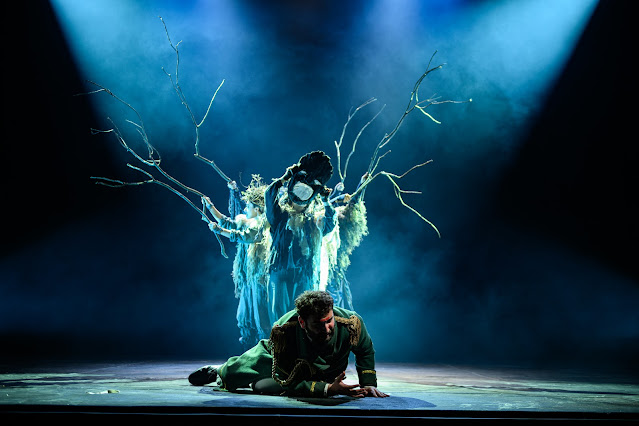 |
| Purcell: Dido & Aeneas – Joshua Saunders as Aeneas with the Witches – Guildhall School (Photo: David Monteith-Hodge) |
Purcell: Dido and Aeneas; Julia Merino, Karima El Demerdasch, Manon Ogwen Parry, Joshua Saunders, director: Oliver Platt, Academy of Ancient Music, conductor James Henshaw; Guildhall School of Music and Drama
Reviewed 11 June 2025
Time travelling production of Purcell’s masterwork recontextualises the drama without explaining or satisfying, but with some strong dramatic performances
Purcell’s Dido and Aeneas is a challenge to directors and performers, to match its compact perfection yet bring the drama alive. The work was written for a very particular set of performing practices, and we don’t even have the original manuscript, so we are left with gaps that have to be filled creatively.
At Guildhall School of Music and Drama, Purcell’s Dido and Aeneas was their chosen opera and rather daringly it was presented on its own, without any accompanying works. Also, we were warned beforehand that the production involved contemporary music, so this was not going to be traditional, was it. Except that the project was also the latest one where players from the Academy of Ancient Music collaborated with the students.
We caught the second night of the production of Purcell’s Dido and Aeneas at the Guildhall School on Wednesday 11 June 2025. The production was directed by Oliver Platt with designs by Alisa Kalyanova, movement by Caroline Lofthouse, lighting by Eli Hunt and video by Mabel Nash. James Henshaw conducted, with Julia Merino as Dido, Karima El Demerdasch as the Sorceress, Manon Ogwen Parry as Belinda, Joshua Saunders as Aeneas, Hannah McKay as Attendant/2nd Woman, Seohyun Go and Julia Solomon as witches, Gabriella Noble as the Spirit and Tobias Compos Santinaque as the Sailor.
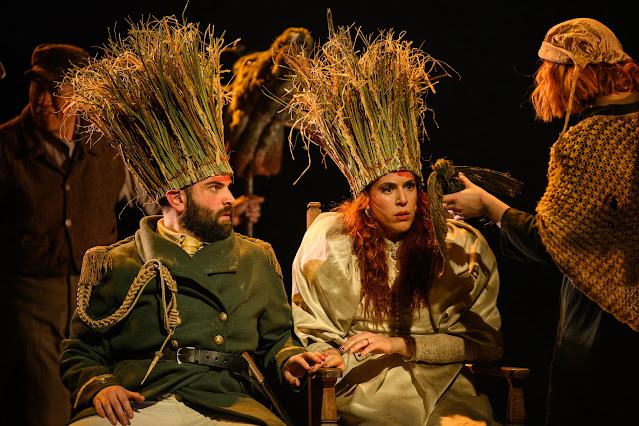 |
| Purcell: Dido & Aeneas – Joshua Saunders, Julia Merino – Guildhall School (Photo: David Monteith-Hodge) |
The programme warned us that the ‘production contains adult content with themes of physical and emotional abuse, including scenes of bloody violence, reference to suicide, themes of kidnap, coercion and threat, implied sexual themes, and gory interaction with depictions of dead animals‘. So, not your average Dido & Aeneas then.
We entered the auditorium with electronic dance music pounding (the music was created by students of Guildhall School Electronic and Produced Music Department). Not the sort of music I would be tempted to dance to, but certainly it filled the theatre with an atmosphere. A woman was dancing, joined by another, the two having a strong connection.
Then as Purcell’s music started, people in 17th century dress appeared and captured the first woman, the second woman reappeared also in 17th century garb and seemed in charge. For the whole of the first scene of the opera the first woman, who we realised was Dido (Julia Merino), was stripped of her modern clothing, dressed in period garb and given a fake crown. The other woman, Belinda (Manon Ogwen Parry) was clearly in charge, and we were in some sort of 17th century inn, and this was not a high-end one, everyone’s faces were dirty. When Aeneas (Joshua Saunders) appeared, he was also being kidnapped. For the first few scenes, Dido and Aeneas were forced through the motions of the plot by Belinda and her cohorts. Was this some sort of folk ritual? But something happened, and ‘real life’ intervened and Dido and Aeneas did fall in love. After their final duet and Aeneas’ farewell, Dido killed Aeneas and went mad. Belinda and her cohorts then killed Dido.
And what of the witches? They were vividly done indeed, but their scenes never properly intersected with the updated scenario and you were rather left wondering who they were and what they were doing. Platt’s scenario rather placed Parry’s Belinda as a baddie too, so we had two manipulative women and I half wondered what would have happened if he had conflated Belinda and the Sorceress!
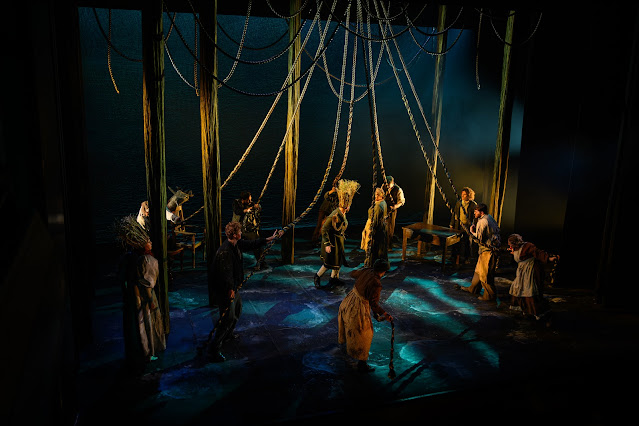 |
| Purcell: Dido & Aeneas – Guildhall School (Photo: David Monteith-Hodge) |
What was frustrating was that there was a lot that was right about this. The refocusing of the drama meant that Merino’s Dido was much more of a spitfire than usual and many of her famous lines were delivered with a terrific sense of verve, with drama and anger, and it worked. Also, there was a lot of dancing, from the hardworking chorus of eight (male countertenors instead of female altos), and the early scenes had a lot of English folk tradition about them, including a threatening May dance and more, whilst the witches’ dress seemed to suggest this folk tradition too.
But the refocusing of the story required more than Purcell’s music and Nahum Tate’s libretto could give, so there was a lot of dumb show and, more disturbingly, a great deal of extra theatrical noise over the top of Purcell’s score. This is something that always annoys me, suggesting that Platt did not find Purcell and Tate enough. This was particularly disturbing at the end, when Purcell’s poignant final chorus was refocused as something threatening, but over the top of it we had the noise of Merino’s Dido being strangled. Needless to say, there was a stunned silence in the theatre at the end.
Dramatically, Julia Merino made a vivid and vigorous Dido, really leaning into the more dramatic element to this characterisation. She made some of the dialogue really stand out, and in terms of drama and character you could not fault her. Her English diction was creditable (she is Spanish, I believe) without being perfect but comprehensible. It sounds as if she has a voice more suitable to 19th century dramatics, she sometimes failed to do justice to Purcell’s musical line, her passage work somewhat smudged and occasionally her tone soured in a way that the 17th century music cannot take. But as a dramatic creation, this Dido really held our attention.
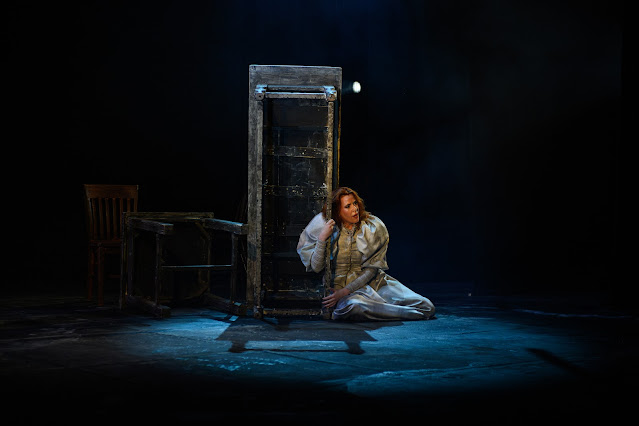 |
| Purcell: Dido & Aeneas – Julia Merino – Guildhall School (Photo: David Monteith-Hodge) |
The refocusing of the drama gave Joshua Saunders little extra to work with as Aeneas, this version of Aeneas was still a cipher and Saunders made him creditable and upright. But there was no opportunity for the soldier, and no sense of the dance leader that the role was intended to be.
Manon Ogwen Parry was mesmerising as Belinda, all flashing eyes and clearly in charge in a way that does not usually happen. Parry sang the role beautifully, but it was the way she managed to lean into this new dramatic conception without damaging the music that was wonderfully impressive. Karima El Demerdasch made a vivid Sorceress, finely sung without any funny voices at all. El Demerdasch suffered somewhat because it was not clear who this woman was, yet she held our attention and created real atmosphere. She and Merino are sharing roles, and I would have been interested to hear the other pairing with El Demerdasch as Dido and Merino as the Sorceress.
Seohyn Go, Julia Solomon and Gabriella Noble were her supporters, and sometimes Platt used the four of them as a single focus so that Noble’s Spirit had their solo upstaged because we saw four writing bodies, but it was a terrific theatrical moment. Tobias Campos Santinaque entered with a will into the conception of his all-singing all-dancing Sailor. His rather slimline voice did not carry quite as well as it ought, but he made a wonderfully appealing tar.
The all-singing all-dancing chorus were terrific, entering into everything with a will and managing to make cod 17th-century quasi folk dancing into something almost terrifying, whilst singing as well. The orchestra was on fine form with eleven players in all including five from AAM. Conductor James Henshaw managed to bring out the drama of the piece whilst honouring the period style, so that the production was indeed all of a piece.
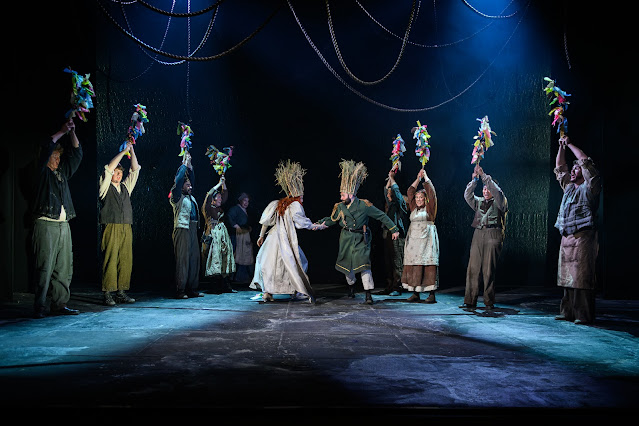 |
| Purcell: Dido & Aeneas – Julia Merino, Joshua Saunders & ensemble – Guildhall School (Photo: David Monteith-Hodge) |
I came away from the evening feeling that perhaps the production had not been daring enough and that more significant musical interventions could have been made, after all we know that sections of the score are missing. As it is, without any explanation in the programme it is difficult to discern quite what Oliver Platt and his team were aiming at, but the ‘nasty folklore’ element to the production hinted at films like The Wicker Man!
The blog is free, but I’d be delighted if you were to show your appreciation by buying me a coffee.
Elsewhere on this blog
- Redefining “Success” as a Classical Musician – guest posting
- From kazoo & harpsichord to electronically-augmented ensemble: Alex Paxton’s Delicious is a multi-layered maximalist delight – cd review
- A window onto the sound world of the Tudor Court on progress: Henry VIII on Tour from Ensemble Pro Victoria & Toby Ward – cd review
- Diverse & eclectic: Peter Cigleris & Amaia Quartet in clarinet quintets by Mozart & the 20th century English composer David Gow – concert review
- More emotional resonance than you might expect: Jonathan Dove & Alasdair Middleton’s Itch at Opera Holland Park – opera review
- Intrigued by stories & narratives: members of Apollo’s Cabinet on their musical exploration of 18th century actress Kitty Clive – interview
- Back to the 1890s: Dinis Sousa & the Orchestra of the Age of Enlightenment move out of their comfort zone reveal magic moments in Elgar – concert review
- Anselm McDonnell’s Politics of the Imagination: Dazzling aural journey, political commentary & playfulness combine with serious purpose – cd review
- La straniera: With Helena Dix in top form, bel canto fireworks illuminate a Bellini rarity from the Chelsea Opera Group – opera review
- A terrific sense of collaboration: composer Colin Matthews and writer William Boyd on their first opera, A Visit to Friends – interview
- Home









